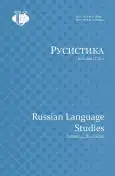Русскоязычный правовой дискурс: правонарушение, совершаемое вербальным способом
- Авторы: Лавицкий А.А.1
-
Учреждения:
- Витебский государственный университет имени П.М. Машерова
- Выпуск: Том 17, № 3 (2019)
- Страницы: 300-314
- Раздел: Актуальные проблемы изучения русского языка
- URL: https://journal-vniispk.ru/2618-8163/article/view/345774
- DOI: https://doi.org/10.22363/2618-8163-2019-17-3-300-314
- ID: 345774
Цитировать
Полный текст
Аннотация
Статья посвящена проблемным вопросам терминологического пространства современной юрислингвистики, в частности понятию «правонарушение, совершаемое вербальным способом», которое активно культивируется исследователями и экспертами-практиками. В современной научной и методической литературе отсутствует общепринятая дефиниция данной лингвоправовой категории, что приводит к вариативности ее понимания. В качестве практического исследовательского материала были использованы статьи Уголовного кодекса (УК) Республики Беларусь. Методология работы включала метод сплошной выборки фактического материала и его статистическую обработку, дискурс-анализ, систематизацию, частично - метод параметризации и семантико-стилистического анализа. В настоящей работе вербальный способ деяния рассматривается сквозь призму оценки предмета правового контроля, в качестве которого для рассматриваемого вида правонарушения выступает текст в самом широком его понимании. Такой подход призван нивелировать терминологическую лакуну и не допустить появления дублирующих понятий (например, «вербальное преступление»). Акцент, сделанный на предметной составляющей преступного действия, позволяет выявить три типа таких правонарушений, совершаемых: 1) преимущественно вербальным способом (доминируют в уголовном законодательстве); 2) часто вербальным способом (достаточно распространены, но в два раза реже встречается в УК, нежели первый тип); 3) вербальным способом (сопоставимы по количественным показателям со вторым типом). Результаты научного исследования представляются важными для развития собственного терминологического аппарата юрислингвистики в целом и лингвоправовой экспертологии в частности.
Ключевые слова
Об авторах
Антон Алексеевич Лавицкий
Витебский государственный университет имени П.М. Машерова
Автор, ответственный за переписку.
Email: anton_lavitski@mail.ru
кандидат филологических наук, доцент, заведующий кафедрой германской филологии
Республика Беларусь, 210038, Витебск, пр-т Московский, 33Список литературы
- Arutyunova, N.D. (1988). Tipy yazykovykh znachenii: otsenka, sobytie, fakt [Types of language meanings: assessment, event, fact]. Moscow: Nauka Publ. (In Russ.)
- Barikhin, A.B. (2010). Bol’shaya yuridicheskaya entsiklopediya [Big legal encyclopedia]. Moscow: Knizhnyi mir Publ. (In Russ.)
- Brinev, K.I. (2009). Teoreticheskaya lingvistika i sudebnaya lingvisticheskaya ekspertiza [Theoretical linguistics and court linguistic expertise]. Barnaul: AltGPA Publ. (In Russ.)
- Galyashina, E.I. (2003). Ponyatiinye osnovy sudebnoi lingvisticheskoi ekspertizy [Conceptual foundations of judicial linguistic expertise]. Theory and practice of linguistic analysis of media texts in forensic examinations and information disputes: scientifi c workshop materials (pp. 48–64). (In Russ.)
- Gogin, A.A. (2017). Verbal’nye ravonarusheniya : ponyatie, sushchnost’, vidy: uchebnoe posobie
- [Verbal Offences: Notion, Meaning, Types: Textbook]. Tol’yatti: Iz-vo TGU Publ. (In Russ.)
- Goiman-Kalinskii, I.V., Ivanets, G.I., & Chervonyuk, V.I. (2003). Elementarnye nachala obshchei teorii: uchebnoe posobie [Elementary bases of the general theory: textbook]. Moscow: KolosS Publ. (In Russ.)
- Golev, N.D. Scientifi c and Legal Terms in the Aspect of Occasional Functioning of the Language: Discussion Points. Retrieved August 18 2018 from: http://konference.siberia-expert. com/publ/konferencija
- Golev, N.D., & Matveeva, O.N. (2006). Lingvisticheskaya ekspertiza: na styke yazyka i prava [Linguistic expertise: at the borderline of language and law]. Yurislingvistika-7: yazyk kak fenomen pravovoi kul’tury [Legal Linguistics – 7: Language as a Phenomenon of Legal Culture]. Barnaul: Altaiskii un-t Publ. (In Russ.)
- Gorelov, I.N. (2003). Izbrannye trudy po psikholingvistike [Selected works on psycholinguistics]. Moscow: Labirint Publ. (In Russ.)
- Grevtsov, Yu., & Kozlikhin, I. (2008). Entsiklopediya prava [Encyclopedia of law]. Saint Petersburg: Sankt-Peterburgskii gos. un-t Publ. (In Russ.)
- Filimonov, N.G. (1926). Spravochnyi kommercheskii slovar’ [Reference dictionary on commerce]. Moscow: Tsentrosoyuza Publ. (In Russ.)
- Khizhnyak, S.P. (1997). Yuridicheskaya terminologiya: formirovanie i sostav [Legal Terminology: Shaping and Composition]. Saratov: SGU Publ. (In Russ.)
- Klyuchnikova, E.L. (2015). O prirode yurislingvisticheskogo termina: postanovka problem [On the nature of the legal term: problem statement]. Vestnik Bashkirskogo universiteta, 4, 1374–1377. (In Russ.)
- Koltunova, E.A. On the issue of the legal status of linguistic expertise. Retrieved October 20 2018 from: http://koltunov-nn.ru/modules/pages/main/publications/lingvojur.html
- Lebedeva, N.B. (2000). O metayazykovom soznanii yuristov i predmete yurislingvistiki [About metalinguistic consciousness of lawyers and the subject of legal linguistics]. Yurislingvistika-2: sbornik nauchnykh trudov [Legal Linguistics – 2: Collection of Scientifi c Works]. Barnaul: Altaiskii un-t Publ. (In Russ.)
- Leichik, V.M. (2007). Terminovedenie: predmet, metody, struktura [Terminology studies: subject, methods, structure]. Moscow: LKI Publ. (In Russ.)
- Maslova, V.A. (2018). Main tendencies and principles of contemporary linguistics. RUDN Journal of Russian and Foreign Languages Research and Teaching, 2, 172–190. (In Russ.)
- Maslova, V.A. (2018). Sovremennye napravleniya v lingvistike [Contemporary scientifi c schools in linguistics]. Vitebsk: VSU Publ. (In Russ.)
- Newman, Ch. (2012). Section 5 of the Public Order Act 1986: The Threshold of Extreme Protes. The Journal of Criminal Law, 76, 105–116.
- O’Halloran, K.L., Tan, S., Wignell, P., & Bateman, J. (2016). Interpreting Text and Image Relations in Violent Extremist Discourse: A Mixed Methods Approach for Big Data Analytics. Terrorism and Political Violence (pp. 1–21).
- Osadchii, M.A. (2016). Russkii yazyk na grani prava [The Russian language in the sphere of law]. Moscow: Librokom Publ. (In Russ.)
- Osadchii, M.A. (2012). Sudebno-lingvisticheskaya parametrizatsiya verbal’noi ugrozy [Court and Linguistic Parameters of Verbal Threats]. Sovremennye problemy nauki i obrazovaniya, 6, 498–507. (In Russ.)
- Official Terminology. Retrieved October 19 2018 from: ‘https://offi cial.academic.ru/26215/%D0%A2%D0%B5%D1%80%D0%BC%D0%B8%D0%BD
- Rylova, E. (2014). Kategorii verbal’nykh prestuplenii v UK RF [Categories of Verbal Crimes in the Russian Federation Criminal Code]. Yurislingvistika [Legal Linguistics], 3(14), 10–25. (In Russ.)
- Rylova, E.D. (2015). Ugolovno-pravovaya kharakteristika verbal’nykh prestuplenii i kriminal’nykh diskursov [Criminal and legal characteristics of verbal crimes and criminal discourses]. Barnaul: AAEP Publ. (In Russ.)
- Sonin, A.G. (2005). Ponimanie polikodovykh tekstov: kognitinvyi aspekt [Understanding Polycode Texts: Cognitive Aspect]. Moscow: RAN Publ. (In Russ.)
- Volodina, M.N. (2000). Kognitivno-informatsionnaya priroda termina (na materiale terminologii sredstv massovoi informatsii) [Cognitive-informational nature of the term (based on the terminology of media)]. Moscow: Lomonosov Moscow State University Publ. (In Russ.)
- Zaitseva, N.Yu. (2002). Informatsionno-semioticheskaya priroda termina i tipologiya yazykov [The informational and semiotic nature of the term and the typology of languages]. Saint Petersburg: Herzen University Publ. (In Russ.)
Дополнительные файлы









